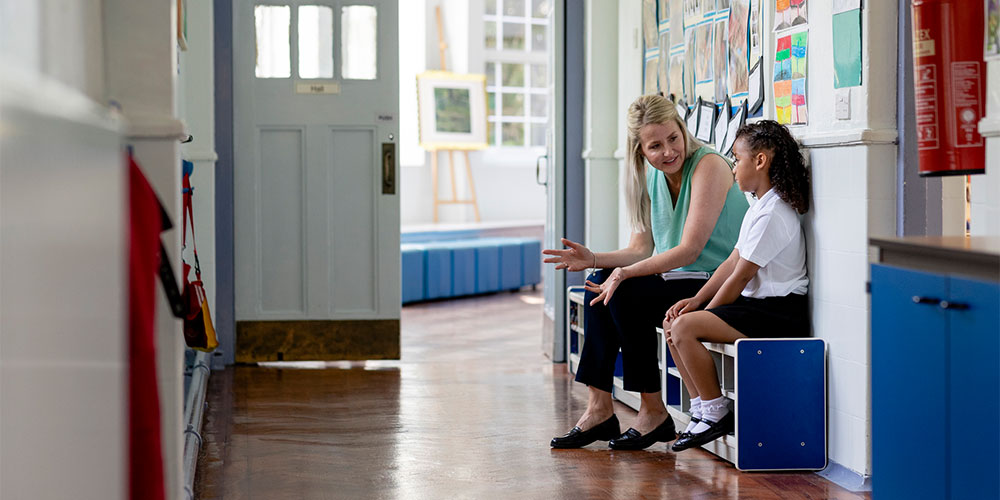In creating classroom activities to enhance SEL, teachers take defibrillators to the chest of human kindness, shocking awake the better angels of our nature. That image sounds a tad unconventional, but the sentiment embodies the noblest truth about education. That is, the whole idea of molding the minds and spirits of young people means creating a future with less hardship.
When we say social–emotional learning (SEL), we’re not using some buzzword to check a box or appease search engine trends. We’re talking about vital skill sets that make life easier for everyone.
Productive communication.
Learning how to disagree.
Coping with hot emotions.
Expressing boundaries.
Being of service to others.
By instilling those vital life skills and more, teachers no doubt stand on the frontlines of the SEL mission.
SEL Classroom Activity 1: Student Interviews
In today’s society, so much depends upon productive communication. As a matter of fact, conveying pertinent information in a tone balanced with equal parts empathy and directness means avoiding any number of conflicts and relationship strains.
Also, if we’re being honest, most people exist within their own universe. Other people serve as planets and moons that orbit around us. In order to step outside of this bubble, and gain greater empathy and insight into our fellow travelers’ psyches, we must make a conscious effort. Enter student interviews, a one-on-one question-and-answer session that holds the possibility of deepening friendships and perhaps even creating unlikely bonds.
Questions can be tailored to fit any age group. Depending on your kids’ maturity level, students might also write their own questions. In the end, ask each participant to reveal what they’ve learned about their interview partner. Interview queries might include:
- Who is your favorite band/musical act and why?
- What is your favorite movie and why do you like it?
- What’s your least favorite food?
- What do you want to do for a living when you leave school?
SEL Classroom Activity 2: All About Me Posters
To be seen and heard constitutes a very real human desire, a core tenet of social–emotional health. Students are not immune to this need. Each of them deserves to feel special every now and again, especially when our society often renders those without the loudest voices invisible.
All About Me posters enable students to control the narrative about how they’re presented to their schoolmates. No matter what age group you’re working with, this SEL classroom activity gives students a brief platform, which is sometimes all they need to feel good about themselves. And, despite what the angstiest of teenagers might say, it’s downright therapeutic to get some markers out and color.
The possibilities are endless. Depending on your class structure, you can design this activity as a carte-blanche free-for-all, or you can include specific parameters. At the end of the assignment, your students will get their moment in the spotlight. Plus, as they learn about their peers’ unique interests and establish empathy and curiosity, other classmates add inches to their SEL growth chart.
In addition to whatever illustrations are appropriate, an All About Me poster might include information on:
- Family and pets
- Hobbies and activities
- Favorite and least favorite school subjects
- Beloved books, movies, and franchises
- Dreams and ambitions
SEL Classroom Activity 3: Guess the Classmate
How well do your students know one another? How could your classroom become a more cohesive, synergistic union? If you’ve conducted student interviews or completed the All About Me poster activity, you have information for the Guess the Classmate game.
Teachers simply use personality trivia that asks students to identify their peers based on unique information about them. While situations change and teachers must use discretion, questions might look like this:
- Whose favorite movie is Turning Red?
- Which of your classmates has a dog named Lilly?
- Who wants to be an engineer when they grow up?
- Who reads manga comics?
SEL Classroom Activity 4: Four-Square Apology Blueprint
Even though this is not a class-wide activity, the four-square apology is a vital resource in a teacher’s toolbox.
Yes, there’s an art and a science to an impactful, heartfelt apology. These days, expressing regret often feels like an arbitrary exercise. To reverse this aloof approach, this template adequately expresses an understanding of and contrition for wrongdoing, and the apologizer gains greater ability to learn and grow. At the same time, the person who experienced the brunt of the wrongdoing feels able to forgive out of empathy, and not only the duty to rise above.
The kids’ book Zach Apologizes by William Mulcahy does an excellent job of illustrating how students can express regret in a way that empowers them to become more empathetic and conscious of their actions. The book outlines the specifics of a four-square apology, which asks children in heated situations to:
- Explain how their words or actions harmed another person.
- Understand how those decisions made that person feel.
- Discuss how they could have acted differently and what they’ll do in the future.
- Outline how they can make the situation better in an immediate timeframe.
SEL Classroom Activity 5: The Worry Box
It’s tough to be a kid. As teachers and as a society, we need to remember that undeniable truth. While (we hope that) adult problems are often more challenging than kids’ issues, growing up presents a particularly tricky set of obstacles. In other words, we’re pretty much born with anxiety, and no matter what, those hot-button feelings impact our day-to-day lives. Children are not exempt.
Enter the Worry Box, which enables kids to write down what bothers them. This activity not only allows for self-expression and identification of issues, but also opens up a crucial channel of information between young people and the teacher who cares about them.
Keep that Worry Box on your desk. Encourage your students to use it any time the need arises. It’s amazing how much you’ll learn and how many problems you can help solve.






